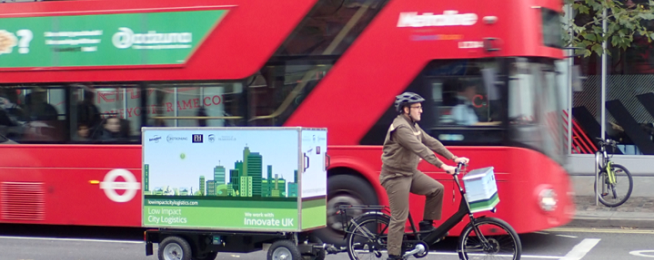The UK government is loading up on cargo bikes as it seeks solutions for the congestion and pollution crises threatening the prosperity of its cities.
The Department for Transport has released a Call for Evidence on the opportunities available to deliver goods more sustainably.
“E-cargo bikes have huge potential for last mile delivery”, DfT says
“They could reduce congestion and pollution, and operate from small hubs or local stores, reducing the need for fleets of delivery vans to drive into urban centres from out of town depots.
“Although they have less capacity than more conventional forms of delivery, they can make many deliveries in one day if supported by a local hub or micro-hub.
"This means that e-cargo bikes can provide economic benefits through the delivery of smaller but higher value freight in cities, such as electrical components and medical supplies. E-cargo bikes can also carry refrigerated goods in specifically designed courier boxes.”
The paper says that the use of e-cargo bikes, micro-vehicles and e-vans in last mile deliveries could improve air quality and reduce greenhouse emissions, reduce congestion and transport costs, and increase productivity.
“Whilst e-cargo bikes might not be the appropriate delivery mode for every location, they are of particular benefit in high-density urban areas as well as narrow streets in historical city centres.
"A network of national e-cargo bike hubs has the potential to support a wide range of clients and consumers. Hubs could assist national and local government in meeting carbon emissions reduction and pollution targets.
"There is a clear opportunity to expand the use of e-cargo bikes for freight delivery in urban centres, but so far there is a lack of structured research into the use of cargo cycles within city logistics. In principle, however, one study has suggested that e- cargo bikes could form 25% of city centre commercial traffic, whilst another has suggested that 51% of all motorised trips in European cities that involve transport of goods could be moved to bikes or cargo bikes.
The Department is seeking information on a wide range of issues including insurance and licensing, training and operations, and urban infrastructure to support electrical-assisted bikes and cargo vehicles.
The Department also believes cargo e-bikes could overcome major failings of the existing diesel van model of delivery,
Research on van use undertaken by Transport for London showed that in London vans are poorly utilised, with 66% being half full or less than half full, with an average load factor (as a proportion of its capacity, by either weight, volume, or both) of 38%.
Due to their size e-cargo bikes potentially offer higher rates of space utilisation than traditional vans.


